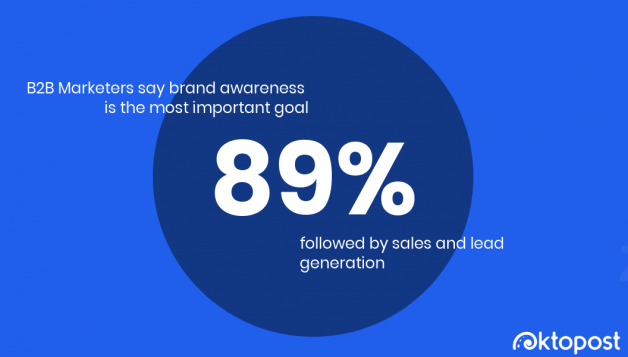
The top 10 B2B marketing strategies
It’s 2020, and businesses now have many ways to gather, slice up, and analyze data. With all that available, there’s no excuse for running a business-to-business marketing campaign that can be accurately described as, “throwing stuff at the wall and seeing what sticks”.
For digital marketers, that’s even more important. The industries and markets digital B2B businesses serve are undergoing dramatic changes. They are always evolving to keep up with the fast pace of technological advancements, new business models, and other shifting paradigms.
These days, marketing initiatives have to justify their existence by showing measurable results. Many marketing executives are inclined to favor quick victories in the short term over long-term strategic gains. Unfortunately, you can only coast on short-term wins for so long before the lack of an overarching strategy catches up with you.
Here at the halfway point of 2020, we’re getting a clearer picture of the B2B marketing strategies that are currently leading the pack. We’re also starting to see the outlines of the ones that will likely make a big splash in the months ahead.
If your marketing strategy feels like it’s out of step with the times — or doesn’t yet exist — here are ten up-and-coming strategies you’ll want to take into consideration.
Strategy 1: Outbound marketing
Outbound marketing refers to endeavors that push your message “out” to potential leads in the wider world. These are methods like advertising, posting flyers, and cold calling. Older marketers used to just call it “marketing.”
Inbound marketing, on the other hand, refers to newer marketing tactics that try to pull leads “in”, such as through blog posts or sponsored content. It’s an article of faith for many digital marketers that inbound is the more effective method. However, the results are slow to come in, and much more difficult to measure.
It’s often the case that once awareness grows around newer marketing methodologies, some buyers shy away from them, and the traditional methods see a resurgence. This may be the case right now with inbound and outbound marketing. We think that a truly effective and well-rounded marketing campaign needs to do both, but don’t give outbound marketing the short shrift just because it might seem outdated.
Strategy 2: Employee advocacy
For a huge number of internet users, social media is their one-stop-shop for everything they do online. At the same time, trust in social media is in a bit of a downward spiral. In other words, people know they can’t trust what they read on social media these days, but they’re still addicted to it. This poses some interesting challenges for social media marketers.

One way of doing an end-run around social media users’ suspicions is employee advocacy. This strategy is built on encouraging or incentivizing the people who work for an organization to talk positively about the organization and its products. Employee advocacy is most effective when it reaches users who know the employee, either personally or by reputation, and have a reason to trust their opinions. In these cases, it’s hard to imagine a more direct or effective way to get your message across to them.
Recommended for further reading
Strategy 3: Business-to-User marketing (B2U)
This is a fairly new way to employ inbound tactics for B2B marketing, particularly with software companies. Inbound marketing has generally been concerned with nurturing decision-makers with content; then moving them further down the sales funnel until they’re fully educated and ready to make a decision on the product you’re selling.
In contrast, B2U marketing doesn’t concern itself with shepherding decision-makers toward a final answer. Instead, B2U marketing emphasizes introducing solutions to end-users. It lets them do the labor of winning over the hearts and minds of buyers, executives, and other decision-makers. Usually, B2U marketing funnels will begin with a free software offering.
The free software is intended to be shared between users within a potential client organization, in order to gain a foothold there. Once enough people within that organization are using the software, the time is ripe to launch outbound marketing initiatives to reach that organization’s key decision-makers. The initiatives inform them that many individuals within their organization are already using the free version of the software, and that they can gain even more value with the paid version.
Strategy 4: Direct media buys
As third-party ad buys become increasingly scarce due to GDPR and a general crackdown on actions perceived to be invasive to users’ privacy, third-party data becomes harder to obtain. This will cause the price of lead acquisition campaigns to go up even as their overall reach and effectiveness decreases.
This gives industry publications an edge. They will still have a substantial amount of data on their users, and their prices won’t seem as intimidating. They also offer a platform on which users are more likely to engage with advertising.

Many users have high levels of trust and respect toward established industry publications. Those publications are able to amass high-quality user data. Because of those two factors, we believe that marketing strategies focusing on direct media purchases from industry publications are likely to provide a substantial return on investment.
Strategy 5: Influencer and co-marketing
We’re living in the age of the influencer, and Instagram is still the capital of their kingdom. A marketing strategy that isn’t getting any likes or shares from us would be one that ignores the unique reach and appeal of social media influencers, and the many possibilities afforded by co-marketing.
Co-marketing is a tactic that aims to take advantage of the strength that another brand already possesses. It does this by combining it with your own brand’s strengths to create wider and greater appeal. This is especially effective among customers who already use or like one of the brands but not the other. What do you call it when Betty Crocker puts a recipe that calls for Reese’s Pieces on a box of their brownie mix? Co-marketing!
Influencer marketing is essentially co-marketing where the other brand is the influencer. Influencer marketing can be risky, because you never know when an influencer is going to have a lapse of judgment and perhaps Tweet something awful. However, don’t underestimate the persuasive power they can wield over their followers.
Strategy 6: In-House conferences
Sometimes it pays to be your own influencer, thought leader, and trend setter. You can accomplish that by hosting conferences.
It’s great to have a booth at an established industry conference, but if you really want to set the tone and shape the message, create one yourself. Find a venue, publicize the conference, and bring in your target audience. As the host and creator of the conference, you’ll be in charge of lead generation, quality control, the speakers, and every other aspect of the experience.
Give your best marketers and salespeople a captive audience, and the chance to put their best ideas to work in a live, in-person setting — and see what they can come up with. At the very least, you can make connections and establish relationships that can create many future opportunities down the line.
Strategy 7: Put sales development under marketing
It makes a lot of sense to incorporate sales development under marketing and lead generation. After all, the activities of sales generation are part of the lead generation effort for sales.
Moving sales development under marketing is a good way to have sales development representatives more focused on lead generation. It allows companies to scale up their lead generation efforts more quickly, without getting bogged down in a sales vs. marketing rift that slows down the process.
Strategy 8: Brand awareness
When your brand awareness is good enough, it can short circuit the buyer cycle. When a potential customer has that light-bulb moment of “Oh, I know this company,” they will often skip over more deliberate steps they might take in researching a purchase.

As short-term digital marketing tactics become more familiar and less effective, companies keep falling back on brand awareness as a tactic with proven value. Many recent studies have shown the effectiveness of brand awareness over time for generating leads and keeping acquisition costs down.
Strategy 9: Time management
Want to get the most out of your marketing dollars? Don’t make your budget too front-heavy. In other words, don’t spend too much at the beginning, when the marketing campaign is just getting off the ground.
Seems counterintuitive? It might seem like a good idea to make a grand entrance, but withholding some expenditures until you’ve had time to find out what is and isn’t working is both smart and prudent. First, do some A/B testing, and get feedback from real customers. Then you can spend your money in a more targeted, strategic, and effective way down the line.
Strategy 10: Content retargeting
Life comes at you fast these days. You can make a great impression on a set of decision-maker eyeballs right before they take their coffee break. But by the time they’re back, they’ve already forgotten the amazingly cool ad they just saw.
There’s no excuse for losing these leads if you can verify their social media identities. Serve ads back to them with a content retargeting program, get remembered, and bring them back into the fold.
Conclusion
There are many ways to market yourself, and in a perfect world you could use all of them simultaneously, and only pay for the ones that generate good leads. Since you can’t do that, do the next best thing: make thoughtful, strategic choices based on solid data analytics, your customers, and your best judgment.
This way, you’ll be sure to find the strategy, or combination of strategies, that is most successful for your business.

